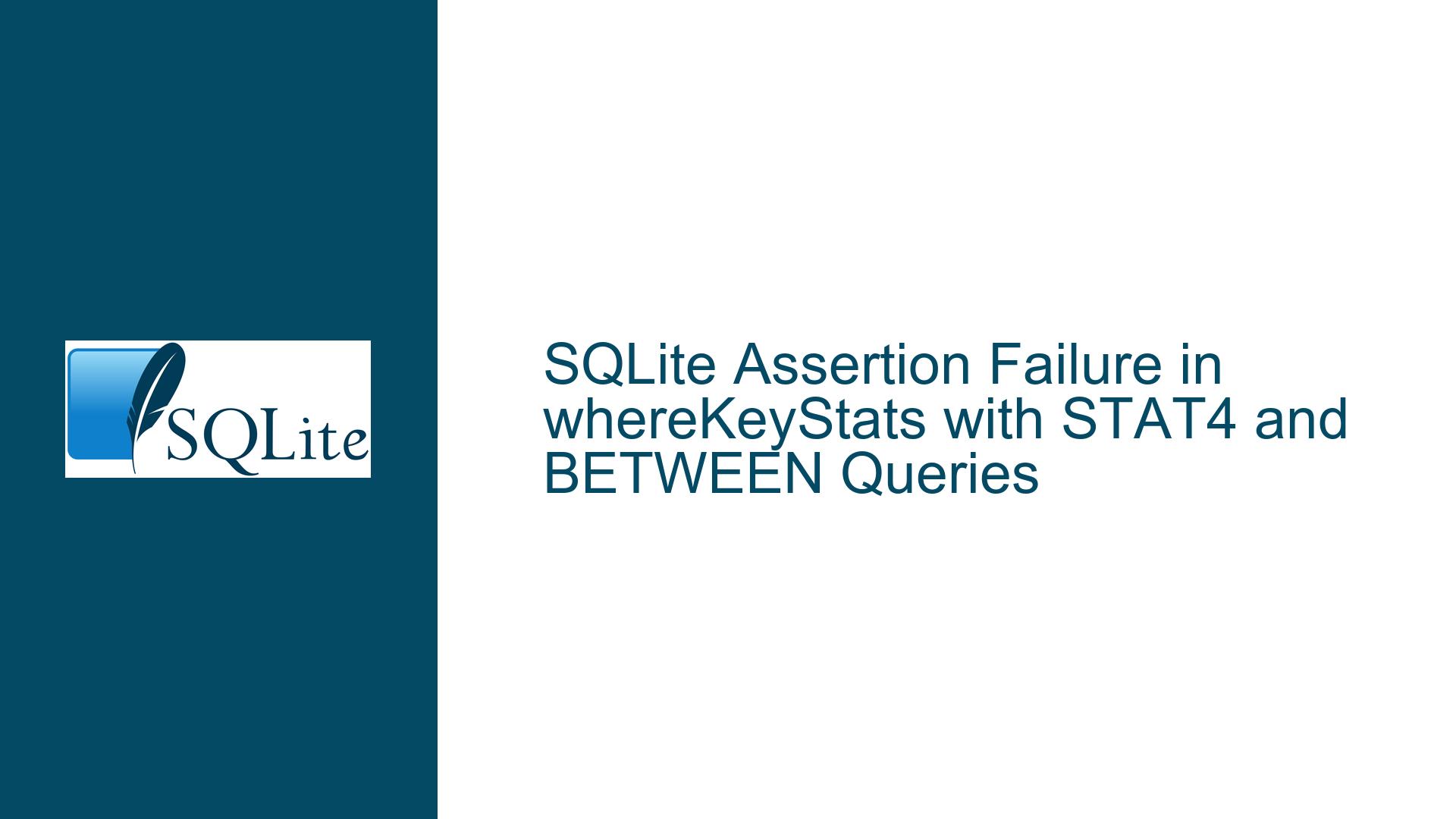SQLite Assertion Failure in whereKeyStats with STAT4 and BETWEEN Queries
SQLite Assertion Failure: pRec->nField>0 && pRec->nField<=pIdx->nSampleCol
The core issue revolves around an assertion failure in SQLite’s query optimizer, specifically within the whereKeyStats function. This failure occurs when executing a SELECT query with a BETWEEN clause on a WITHOUT ROWID table, particularly when the SQLITE_ENABLE_STAT4 compile-time option is enabled. The assertion pRec->nField>0 && pRec->nField<=pIdx->nSampleCol fails, indicating a mismatch between the number of fields in the record (pRec->nField) and the number of columns sampled for index statistics (pIdx->nSampleCol). This issue is deeply rooted in SQLite’s handling of index statistics and query optimization, and it manifests under specific conditions involving WITHOUT ROWID tables and the STAT4 feature.
The problem is triggered when the query optimizer attempts to use index statistics to estimate the selectivity of a BETWEEN clause. The STAT4 feature, which enhances the accuracy of these statistics by sampling more data, inadvertently exposes a flaw in the logic that validates the number of fields in the record against the number of columns sampled. This flaw becomes apparent when the query involves a WITHOUT ROWID table and a BETWEEN clause that references multiple columns, particularly when one of the columns is part of a primary key.
The assertion failure is a safeguard that ensures the integrity of the index statistics used by the query optimizer. When this assertion fails, it indicates that the optimizer is attempting to use invalid or incomplete statistics, which could lead to incorrect query plans and potentially erroneous results. This issue is particularly insidious because it only occurs under specific conditions, making it difficult to detect and diagnose without a deep understanding of SQLite’s internals.
Compile-Time Option SQLITE_ENABLE_STAT4 and Index Statistics Mismatch
The root cause of the assertion failure lies in the interaction between the SQLITE_ENABLE_STAT4 compile-time option and the way SQLite handles index statistics for WITHOUT ROWID tables. The STAT4 feature, which is enabled by the SQLITE_ENABLE_STAT4 option, enhances the accuracy of index statistics by sampling more data from the table. However, this enhancement introduces a subtle bug in the logic that validates the number of fields in the record against the number of columns sampled for index statistics.
When the STAT4 feature is enabled, SQLite collects more detailed statistics about the distribution of values in the indexed columns. These statistics are used by the query optimizer to estimate the selectivity of various query predicates, such as BETWEEN clauses. However, the logic that validates the number of fields in the record (pRec->nField) against the number of columns sampled for index statistics (pIdx->nSampleCol) does not account for the specific conditions that arise when querying WITHOUT ROWID tables.
In the case of WITHOUT ROWID tables, the primary key is stored directly in the table’s B-tree, and the index statistics are collected differently compared to regular tables. This difference in how index statistics are collected and validated leads to the assertion failure when the query optimizer attempts to use these statistics to estimate the selectivity of a BETWEEN clause. The mismatch between pRec->nField and pIdx->nSampleCol indicates that the optimizer is attempting to use invalid or incomplete statistics, which triggers the assertion failure.
The bug has been present in SQLite since version 3.15.0, but it only manifests under specific conditions involving WITHOUT ROWID tables and the STAT4 feature. This explains why the issue has remained undetected for so long, as most applications do not use WITHOUT ROWID tables or enable the STAT4 feature. However, for applications that do use these features, the assertion failure can be a significant issue, as it can lead to crashes or incorrect query results.
Fixing the Assertion Failure: Upgrading SQLite and Disabling STAT4
The most straightforward solution to this issue is to upgrade to a version of SQLite where the bug has been fixed. The bug was addressed in SQLite version 3.39.0 and later, so upgrading to a version equal to or greater than 3.39.0 will resolve the issue. However, if upgrading is not an option, there are several workarounds that can be implemented to avoid the assertion failure.
One workaround is to disable the SQLITE_ENABLE_STAT4 compile-time option. Disabling this option will prevent SQLite from using the enhanced index statistics provided by the STAT4 feature, which in turn will avoid the assertion failure. However, this workaround comes at the cost of reduced query optimization accuracy, as the STAT4 feature provides more accurate statistics that can lead to better query plans. Disabling STAT4 should only be considered as a temporary measure until the SQLite version can be upgraded.
Another workaround is to avoid using WITHOUT ROWID tables in queries that involve BETWEEN clauses on multiple columns. If the table can be redesigned to use a regular rowid table, the assertion failure will not occur. However, this workaround may not be feasible for all applications, as WITHOUT ROWID tables are often used for performance reasons or to enforce specific constraints.
For applications that must use WITHOUT ROWID tables and require the STAT4 feature, the best course of action is to upgrade to a version of SQLite where the bug has been fixed. This will ensure that the query optimizer can use the enhanced index statistics provided by STAT4 without triggering the assertion failure. Additionally, upgrading to the latest version of SQLite will provide access to other bug fixes and performance improvements that may benefit the application.
In summary, the assertion failure in whereKeyStats is caused by a mismatch between the number of fields in the record and the number of columns sampled for index statistics when using WITHOUT ROWID tables and the STAT4 feature. The issue can be resolved by upgrading to SQLite version 3.39.0 or later, or by disabling the STAT4 feature as a temporary workaround. For applications that require WITHOUT ROWID tables and the STAT4 feature, upgrading to a fixed version of SQLite is the recommended solution.






